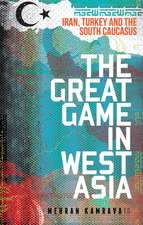Ideology and the Evolution of Vital Institutions: Guilds, The Gold Standard, and Modern International Cooperation
Autor Earl A. Thompson, Charles R. Hicksonen Limba Engleză Hardback – 30 iun 2001
The authors explain why an effective democratic state must avoid `narrow, short-sighted', rational appearing concessions to a sequence of aggressors. In short, the Thompson-Hickson interpretation of the rise of wealthy dominant nations does not rely on advice of superior intellectual advisors, but instead rests on the pragmatic, almost ad hoc, actions of democratic legislators.
| Toate formatele și edițiile | Preț | Express |
|---|---|---|
| Paperback (1) | 950.96 lei 6-8 săpt. | |
| Springer Us – noi 2012 | 950.96 lei 6-8 săpt. | |
| Hardback (2) | 956.99 lei 6-8 săpt. | |
| Springer Us – 31 iul 2000 | 956.99 lei 6-8 săpt. | |
| Springer Us – 30 iun 2001 | 956.99 lei 6-8 săpt. |
Preț: 956.99 lei
Preț vechi: 1167.06 lei
-18% Nou
Puncte Express: 1435
Preț estimativ în valută:
183.17€ • 188.76$ • 154.64£
183.17€ • 188.76$ • 154.64£
Carte tipărită la comandă
Livrare economică 03-17 martie
Preluare comenzi: 021 569.72.76
Specificații
ISBN-13: 9780792373902
ISBN-10: 0792373901
Pagini: 406
Ilustrații: XIX, 406 p.
Dimensiuni: 155 x 235 x 24 mm
Greutate: 0.78 kg
Ediția:2nd ed. 2001
Editura: Springer Us
Colecția Springer
Locul publicării:New York, NY, United States
ISBN-10: 0792373901
Pagini: 406
Ilustrații: XIX, 406 p.
Dimensiuni: 155 x 235 x 24 mm
Greutate: 0.78 kg
Ediția:2nd ed. 2001
Editura: Springer Us
Colecția Springer
Locul publicării:New York, NY, United States
Public țintă
ResearchCuprins
1 Overview.- I An Example: Significant Bilateral Exchange.- II Generalizing the Example: A Theory of Social Organization.- III How Optimality Criteria Depend upon the Political Environment.- IV Rationalizing Citizen-Efficiency and Distributional Advice.- V The Need for a Rapid Adjustment Process.- VI Achieving Rapid Adjustment: Vitalness and Effective Democracy.- VII The Economic Benefits of Effective Democracy: Efficiency Tests.- VIII The Impermanence of Dominance.- IX A Brief Readers’ Guide for Specialists.- X The Evolutionary Argument: A More Detailed Readers’ Guide.- XI Extension to Biology: An Evolutionary Principle.- XII A Summary of the Policy Framework.- 2 The Efficiency Problem, the Distribution Problem, and a Possible Solution.- I The Efficiency Problem.- II The Distributional Problem.- III A Constitutional Solution.- 3 A New Interpretation of Guilds, Tariffs, and Laissez Faire.- Abstract and Introduction.- I An Efficiency-Based Theory of Democratic Political Associations.- II Efficient Guild Policies.- III The Economic Policies Generated by Protectionist Lobbies.- IV Policy Conclusion: On the Beating of Live Horses.- 4 On the Gold Standard: Why Depressions have been a Necessary Evil, or How the Economics of Keynes Dethroned Europe.- Introduction: Emergency Finance and the Gold Standard.- I Mainstream Macroeconomics and the Gold Standard.- II Business Cycles and the Gold Standard.- III The Broad Price Trends Observed under the Gold Standard.- IV Emergency Finance after the Gold Standard.- 5 On Modern International Cooperation: Exchange Controls, Hyperinflation, and Costly Social Revolution as Efficient National Responses to Externally Imposed Trade Liberalization.- Abstract and Introduction.- I The Primary Western Policy Imposition and the Responses of theDependent Nations.- II Peacetime Hyperinflation as a Rational Response to Dominant-Country Reactions to Permissible Exchange Controls.- III A Model of Rational Hyperinflation.- IV Statistical Analysis.- V Graphical Summary.- VI Conclusions.- 6 Summary, Policy Implications, and a Final Test.- I Vital Institutions and Civilizational Upturns.- II Civilizational Downturns and How to Avoid Them.- III Avoiding the Pending Distributional Disaster.- IV Does Economics Have Another Lesson for Biology?.- V Life in the Fast Lane.- VI An Intellectual Effect of the Proposed Policy.- References for the Text and A-Appendices.









